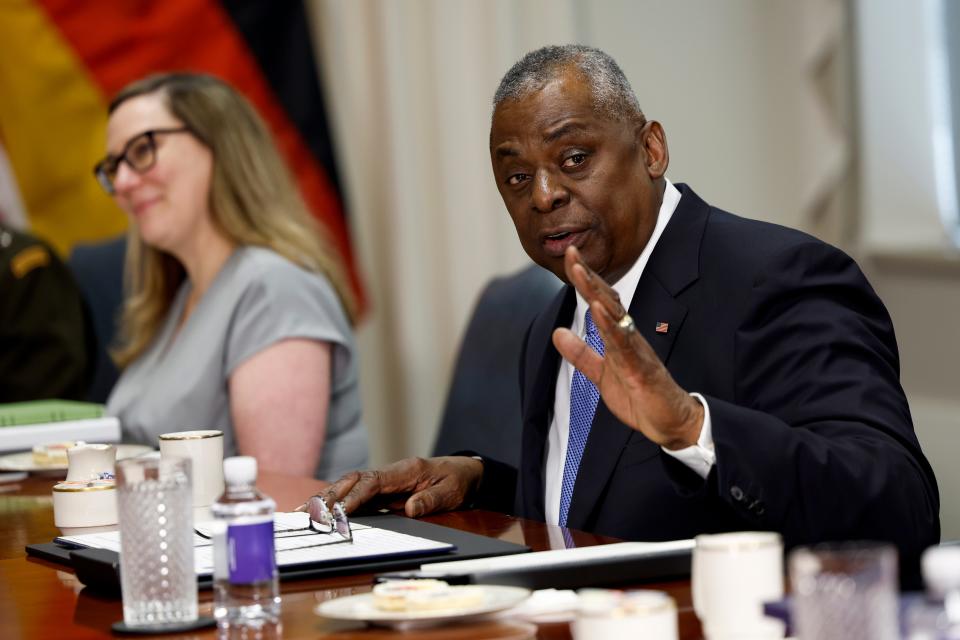After USA TODAY investigation, watchdog report says military failed to screen extremist recruits
An internal Department of Defense audit has found military recruiters frequently failed to complete mandated checks to find recruits who are members of extremist groups, including not giving a screening questionnaire to 4 in 10 eligible recruits.
The new watchdog report amplifies the findings of a USA TODAY investigation last month, which concluded the military was unable to show any results for most of the steps in its sweeping new effort to combat extremism in the ranks.
Of 20 action steps specified by the Defense secretary and a military working group to tackle extremism, most appeared stalled or inactive, USA TODAY found. Asked specifically how many recruits had been screened out, and how many times recruiters had used new tools to scrutinize recruits' tattoos or personal histories as directed, military officials were unable to provide answers.

The new report, completed by the Department of Defense Inspector General this month and announced on Monday, provided new specifics, from a statistical sample of recruits from July 2021 through January 2022.
It found 41% of applicants who were supposed to undergo additional screening were not asked about extremist or gang affiliations. And 40% were not asked to complete new screening forms that were introduced to the military recruitment process in 2021.
"It's unacceptable," said Heidi Beirich, co-founder of the Global Project Against Hate and Extremism. "It's really just shocking that they aren't taking this seriously."
On Tuesday morning, the Department of Defense sent USA TODAY a statement acknowledging that: "due to some additional oversight it was discovered that some recruiters were not utilizing the required applicant screening steps. As a result Military Service recruiters may not have identified all applicants with extremist or criminal gang associations during the screening process."
A military official said the department has recommended more steps and reviews to make sure recruiters comply with the new rules
Investigation: The military ordered big steps to stop extremism. Two years later, it shows no results
Extremism in the military
Secretary of Defense Lloyd Austin launched a revolutionary new effort to combat extremism in military ranks in the wake of the Jan. 6, 2021, insurrection.
Being affiliated with the U.S. military is the “single strongest” predictor of violent extremism in America, according to a report earlier this year from researchers with the University of Maryland’s National Consortium for the Study of Terrorism and Responses to Terrorism, or START.
Austin's reforms sought to confront extremism before, during and after military service. In April 2021, he authored a memo calling for four "Immediate Actions" to be taken to address extremism. The second of these required military recruiters across the armed forces to update their screening questionnaires to grill potential recruits about any previous involvement with extremist groups.
But as detailed in USA TODAY's exclusive story last month, the military since then has been largely unable to demonstrate any effects of the new efforts.
A working group was formed to assess the military's progress in implementing Austin's changes, including his order to update and standardize so-called accession screening questionnaires for new recruits. The working group concluded in December 2021 that the armed forces had updated those forms to include questions about whether recruits were part of racially biased or extremist groups.
But when USA TODAY asked to review copies of those new questionnaires this year, the military did not provide them. Indeed, in response to a request under the federal Freedom of Information Act, Marine Corps officials on Monday said they could not locate a current accession screening questionnaire and requested further clarity about what, exactly, the form might be.
As the new audit finds, recruiters often aren't using the new questionnaires anyway.
The audit's findings
In addition to not using the new screening questionnaires, the Inspector General's audit also found:
◾ 9% of applicants were not fingerprinted.
◾ 1% of applicants (one person) did not undergo a background check.
◾ Air Force recruiters initially erroneously labeled 34% of the sample of recruits as having extremist or gang affiliations. Despite the false red flags, however, those recruits' applications were not halted "because of a lack of system controls."
The Inspector General found that most recruits were being checked for questionable tattoos, with recruiters failing to check for them in only 9% of cases. But the military's extremism efforts called on recruiters to do more than simply review tattoos.
The previous military working group touted a partnership offering military recruiters access to FBI databases of extremist symbols, specifically to review questionable tattoos. When USA TODAY asked the military and FBI how often this partnership was being used, the agencies had no response.
The new Inspector General's report concludes: "While the FBI is available to assist with tattoo analysis, we did not identify any instances where recruiters contacted the FBI."
The Inspector General's survey obtained data about applicants from a statistical sample of recruits. From July 1, 2021, to Jan. 31, 2022, inspectors sampled a population of 193,702 people to examine the records of about 200 people.

The Inspector General's office included in its audit a list of recommendations to fix the recruiting problems. "Officials from the Offices of the Secretary of the Army, Navy, and Air Force agreed with the recommendations," the report says.
Some branches of the armed services told inspectors they had already brought in new changes. The Army, for example, has pledged to stop applications from anyone who admits to past involvement with criminal gangs or extremists, the audit states. A waiver is then required for the application to continue.
An 'astonishing lack of commitment'
Kathleen Belew, a Northwestern University historian and author of “Bring the War Home: The White Power Movement and Paramilitary America,” has been sounding the alarm about extremism in the military for years. Belew called the Inspector General's findings "an astonishing lack of commitment to a problem that the FBI, DHS, and DOD itself have recognized as a threat to our nation: extremism, and violent attacks, by white power and militant right activists."
"It seems to me that either people aren't following military policy ... or that the policy was only for show," Belew wrote to USA TODAY. "Either scenario is a damning indictment of our attempt to reckon with the high number of military personnel involved in extremist violence."
Still waiting on an internal study
Another of Austin’s orders was to commission a study into extremism in the military’s “total force,” something experts told USA TODAY would be an essential foundation for dealing with the problem.
USA TODAY confirmed that the study was completed more than a year ago, in June 2022, but as of last month remained in an indefinite holding pattern as senior leaders review its findings. The Inspector General's report makes no mention of the total force study, which has yet to be released.
This article originally appeared on USA TODAY: Military failed to screen for extremists, Inspector General finds

